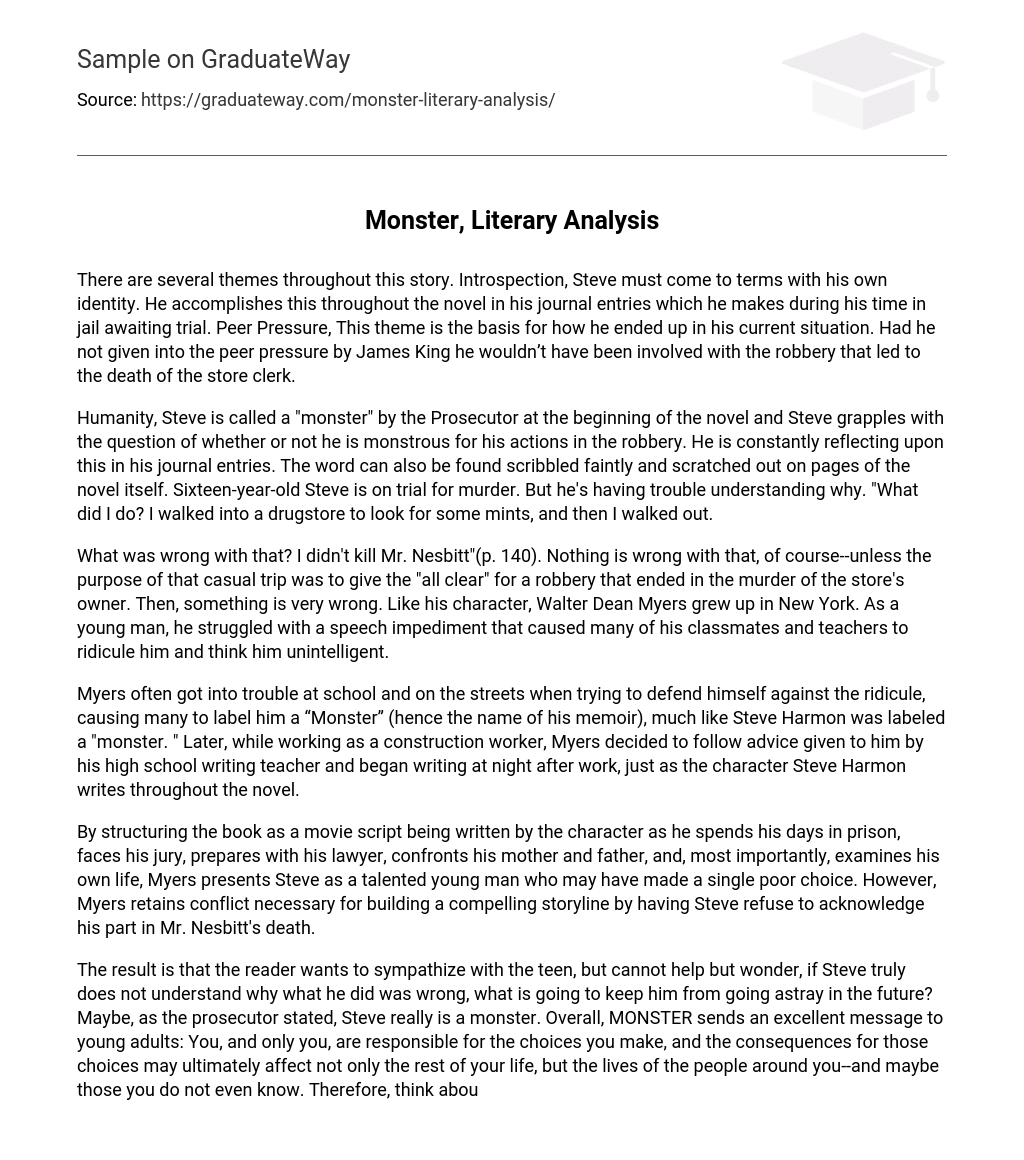There are several themes throughout this story. Introspection, Steve must come to terms with his own identity. He accomplishes this throughout the novel in his journal entries which he makes during his time in jail awaiting trial. Peer Pressure, This theme is the basis for how he ended up in his current situation. Had he not given into the peer pressure by James King he wouldn’t have been involved with the robbery that led to the death of the store clerk.
Humanity, Steve is called a “monster” by the Prosecutor at the beginning of the novel and Steve grapples with the question of whether or not he is monstrous for his actions in the robbery. He is constantly reflecting upon this in his journal entries. The word can also be found scribbled faintly and scratched out on pages of the novel itself. Sixteen-year-old Steve is on trial for murder. But he’s having trouble understanding why. “What did I do? I walked into a drugstore to look for some mints, and then I walked out.
What was wrong with that? I didn’t kill Mr. Nesbitt”(p. 140). Nothing is wrong with that, of course–unless the purpose of that casual trip was to give the “all clear” for a robbery that ended in the murder of the store’s owner. Then, something is very wrong. Like his character, Walter Dean Myers grew up in New York. As a young man, he struggled with a speech impediment that caused many of his classmates and teachers to ridicule him and think him unintelligent.
Myers often got into trouble at school and on the streets when trying to defend himself against the ridicule, causing many to label him a “Monster” (hence the name of his memoir), much like Steve Harmon was labeled a “monster. ” Later, while working as a construction worker, Myers decided to follow advice given to him by his high school writing teacher and began writing at night after work, just as the character Steve Harmon writes throughout the novel.
By structuring the book as a movie script being written by the character as he spends his days in prison, faces his jury, prepares with his lawyer, confronts his mother and father, and, most importantly, examines his own life, Myers presents Steve as a talented young man who may have made a single poor choice. However, Myers retains conflict necessary for building a compelling storyline by having Steve refuse to acknowledge his part in Mr. Nesbitt’s death.
The result is that the reader wants to sympathize with the teen, but cannot help but wonder, if Steve truly does not understand why what he did was wrong, what is going to keep him from going astray in the future? Maybe, as the prosecutor stated, Steve really is a monster. Overall, MONSTER sends an excellent message to young adults: You, and only you, are responsible for the choices you make, and the consequences for those choices may ultimately affect not only the rest of your life, but the lives of the people around you–and maybe those you do not even know. Therefore, think about what you are doing, consider the consequences of your actions, and choose wisely.
Myers, Walter (April 21, 1989). Monster. New York: HarperCollins. p. 281. Boston Globe–Horn Book Awards, Honor Book,1999 Los Angeles Times Book Prize, Young Adult Fiction, Finalist 1999 Coretta Scott King Awards, Honor Book, 2000 Edgar Allan Poe Awards, Nominee, Best Young Adult Novel, 2000 Michael L. Printz Award, Winner, 2000 Kentucky Bluegrass Award, Grades 9-12, Winner, 2002 Mechele R. Dillard for TeensReadToo. com, www. goodreads. com





